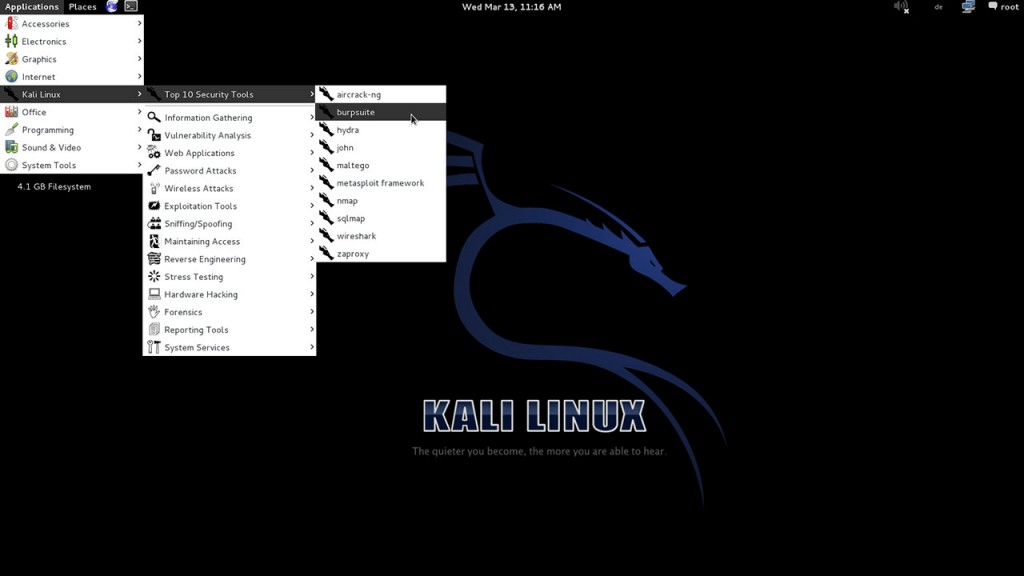If you consider yourself a penetration tester or security expert then you are already aware of BackTrack Linux, a distro well known for its pen-test purpose. Today, Kali Linux replaces BackTrack as it is the new generation of the industry leading penetration testing and security auditing Linux distribution. Instead of building upon Ubuntu (BackTrack), Kali Linux prefers the rebuild from the ground up, adhering completely to Debian development standards.
They state that:
“Once we realized we were free from the bonds of our old environment, we started musing about the base platform we want to build our next penetration testing distribution – the main players on our table were Debian and Ubuntu. With both options heavily weighed and gently avoiding philosophical rants about the pros and cons of each, Debian was our final choice.“
Notably, there is support for ARM based systems. Kali team knows very well that ARM based systems are becoming more and more prevalent and inexpensive, that’s why Kali needs a robust support for ARMEL and ARMHF systems. It’s truly magnificent to run a pen-test toolkit in your pocket (like a Raspberry Pi).
Specifications
- – More than 300 penetration testing tools: After reviewing every tool that was included in BackTrack, we eliminated a great number of tools that either did not work or had other tools available that provided similar functionality.
- – Free and always will be: Kali Linux, like its predecessor, is completely free and always will be. You will never, ever have to pay for Kali Linux.
- – Open source Git tree: We are huge proponents of open source software and our development tree is available for all to see and all sources are available for those who wish to tweak and rebuild packages.
- FHS compliant: Kali has been developed to adhere to the Filesystem Hierarchy Standard, allowing all Linux users to easily locate binaries, support files, libraries, etc.
- – Vast wireless device support: We have built Kali Linux to support as many wireless devices as we possibly can, allowing it to run properly on a wide variety of hardware and making it compatible with numerous USB and other wireless devices.
- – Custom kernel patched for injection: As penetration testers, the development team often needs to do wireless assessments so our kernel has the latest injection patches included.
- Secure development environment: The Kali Linux team is made up of a small group of trusted individuals who can only commit packages and interact with the repositories while using multiple secure protocols.
- – GPG signed packages and repos: All Kali packages are signed by each individual developer when they are built and committed and the repositories subsequently sign the packages as well.
- – Multi-language: Although pentesting tools tend to be written in English, we have ensured that Kali has true multilingual support, allowing more users to operate in their native language and locate the tools they need for the job.
- – Completely customizable: We completely understand that not everyone will agree with our design decisions so we have made it as easy as possible for our more adventurous users to customize Kali Linux to their liking, all the way down to the kernel.
- ARMEL and ARMHF support: Since ARM-based systems are becoming more and more prevalent and inexpensive, we knew that Kali’s ARM support would need to be as robust as we could manage, resulting in working installations for both ARMEL and ARMHF systems. Kali Linux has ARM repositories integrated with the mainline distribution so tools for ARM will be updated in conjunction with the rest of the distribution.
The name Kali Linux, stems from the Hindu religion. The name Kali comes from kāla, which means black, time, death, lord of death, Shiva. Since Shiva is called Kāla—the eternal time—Kālī, his consort, also means “Time” or “Death” (as in time has come). Hence, Kāli is the Goddess of Time and Change.








